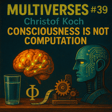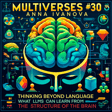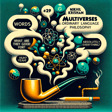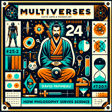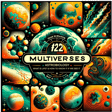
23| Paulina Sliwa — Moral philosophy as puzzles of daily life
Why do men do less housework? What happens when an apology is offered? What are we looking for when we ask for advice?
These are the sorts of problems drawn from everyday experience that Paulina Sliwa intends to resolve and in doing so make sense of the ways we negotiate blame and responsibility.
Paulina is a Professor of Moral & Political Philosophy at the University of Vienna. She looks carefully at evidence accessible to us all — daily conversations, testimony from shows like This American Life, and our own perceptions — and uses these to unravel our moral practices. The results are sometimes surprising yet always grounded. For example, Paulina argues that remorse is not an essential feature of an apology, nor is accepting that behavior was unjustified.
This is illuminating for its insights into moral problems, but I also really enjoyed seeing how Paulina thinks, it's a wonderful example of philosophical tools at work.
Links
- Paulina's website with links to many of her papers
- Multiverses.xyz
Milestones
(0:00) Into
(3:00) Start of conversation: grand systems vs ordinary practices of morality
(5:30) Philosophy and evidence
(6:39) Apologies
(8:40) Anne of Green Gables: an overblown apology
(10:50) Remorse is not an essential feature of apologies
(12:00) Apologies involve accepting some blame
(15:30) Why apology is not saying I won’t do it again
(17:17) Essential vs non-essential features of apologies
(18:12) Apologies occur in many different shapes, is a unified account possible?
(20:00) Moral footprints
(24:10) Apologies and politeness
(26:20) Tiny apologies as a commitment to moral norms
(29:50) Moral advice — verdictive vs hermeneutic (making sense)
(33:30) Moral advice doesn’t need to get us to the right answer but it should get us closer
(36:30) Perspectives, affordances and options
(38:40) Perspectives vs facts
(46:45) Housework: Gendered Domestic Affordance Perception
(49:40) Evidence that affordances are directly perceived (and not inferred)
(52:00) Convolutional neural networks as a model of perception
(53:00) Environmental dependency syndrome
(54:30) Perceptions are not fixed
(59:30) Perception is not a transparent window on reality
(1:01:00) Tools of a philosopher
(1:03:20) A Terribly Serious Adventure - Philosophy at Oxford 1900-60 — Nikhil Krishnan
(1:04:50) Philosophy as continuous with science
(1:06:17) Philosophy is not a neutral enterprise:
(1:09:00) Santa: Read letters!
(1:10:10) Apologise less


